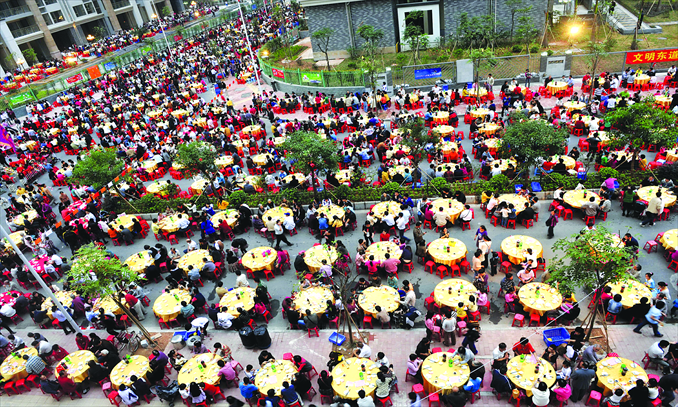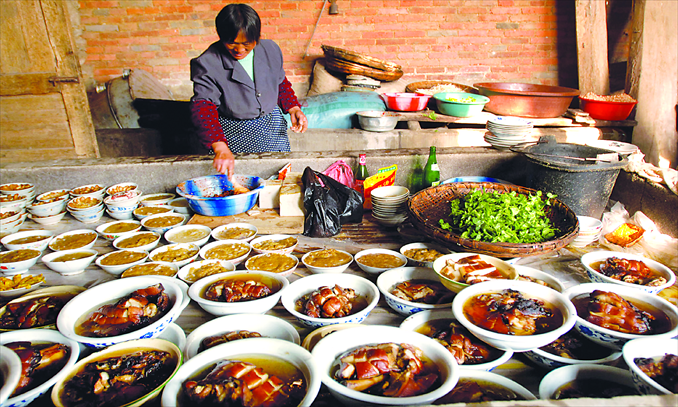Bankrupt banquets

Parties should be fun. But in many areas of China, supposed celebrations have brought little but suffering.
In many Chinese villages and towns excessive feasts have brought heavy financial burdens for local people, or worse, driven people to leave their hometowns desperately to avoid feasts. Apart from the expense of the banquet itself, the giving of costly gifts or envelopes of cash is expected at most Chinese events.
In Hefeng, a poverty-stricken county with a population of 220,000 in Central China's Hubei Province, the local government banned people from extravagant feasts, save for marriages and funerals, in December last year, hoping to divert people's attention to developing the local economy, rather than indulging in booze-fuelled banquets. Local banqueting culture had spiraled completely out of control.
The Hefeng county government has estimated the ban helped save as many as 60 million yuan ($9.5 million). "Villagers can spare cash gifts and invest in productive activities," Luo Ping, the local official in charge of the implementation of the ban, told the Global Times.
Financially burdened
"An old man walked fast towards me, carrying luggage on his shoulder. I asked why he was in a hurry. He replied he had to get out of the village soon because he could not afford to give money or gifts to people who invited him to feasts," Yang Anwen, Party Secretary of Hefeng county, told Xiaoxiang Morning Herald.
The incident stirred Yang, who was newly appointed as the top leader in Hefeng. In May 2011, two working groups were dispatched to investigate the banqueting culture in eight counties and 16 villages in Hefeng.
It was found that various feasts were held to celebrate a wide range of occasions, including the birth of a new baby, landmark birthdays, enrollment into university, joining the army, moving into a new house, renovating a home and opening a restaurant.
Holding feasts had become the best tool for collecting money. Feasts were even held to celebrate a new litter of pigs.
Some used gift money to amass funds to construct a house. They would hold the first banquet when they laid a building's foundation, followed by other feasts to celebrate the completion of each story and the final completion of the house, local reports said.

"If you don't hold a feast, it is impossible for you to get back the cash that you've sent to others when being invited to feasts. This created a vicious cycle where people competed to hold feasts," Luo told the Global Times, adding that people held feasts even when they had nothing to celebrate.
Statistics showed it was common for local people to be invited to five or six feasts every day. Unable to attend all the feasts, many would still ask others to deliver cash gifts to the hosts for them.
The amount of the gift money depends on the closeness between the inviter and the invitee. The standard gift amount in rural areas ranges from 50 to 400 yuan per occasion.
As a poverty-stricken county, the per capita net income of rural residents in Hefeng was 3,833 yuan last year.
A person living in a rural area in Hefeng county typically sent gift money totaling 3,400 yuan last year, while the expense for the average urban resident was 3,700 yuan, official statistics showed.
A civil servant from the local education bureau who refused to be named told the Global Times that even though both he and his wife worked in the government, they used to borrow money from relatives and friends for gift money.
Forbidding a folk tradition
On December 20 last year, the local government banned extravagant feasts, except for marriages and funerals. The ban was firstly implemented among government officials. Officials who violated the ban were given disciplinary punishments.
After four officials were punished in December, the unhealthy custom was stopped in the government ranks. Shortly after, a massive campaign against excessive feasts swept across the county.
"It was very difficult at the very beginning. Hosting feasts is a kind of folk custom, and the public power had no legal grounds to intervene," Luo said.
In rural areas where people are closely connected, eradicating banquet culture proved even tougher.
At last, they resorted to village regulations to impose restraints on locals.
In Hefeng's Qifengguan village, residents and banquet companies that violated the ban would be fined 50 to 500 yuan. The fine revenue would be used on village programs for the public good, according to the regulations.
Not all villagers were supportive. "Households that planned to get money by holding a feast when the ban took effect were displeased," Zhang Qun, village head of Qifengguan, told the Global Times.
"We haven't hosted a feast in the past year, while we gave more than 100,000 yuan as gift money the year before," complained Zhang Chuanyi, a local villager who wished to make back some money by hosting a banquet.
Local officials have tried every means to stop villagers from holding feasts.
"As many as eight village officials woke up at around six in the morning and blocked the entrance of the village, persuading villagers who were invited to feasts to go back home," Zhang Qun said.
Other strategies include reporting violators' punishments via village loudspeakers to act as a deterrent, cutting off electricity and water on feast days, and visiting hosts' homes and lobbying for them to give up feasts.
"It is exhausting, but it has paid off," Zhang Qun said. The average expense on gifts has declined from 6,000 yuan before the ban to 1,000 yuan, he said.
"Being afraid of losing face, villagers who worked in big cities would send hard-earned money home soon after they got a salary. Since the ban was implemented, things have been totally different. People can spend money on developing crops and breeding industry," Zhang noted.
He used to receive up to 15 invitations to feasts a day and give at least 50,000 yuan is cash gifts each year before the ban was implemented, the village head said.
Not all were supportive. Some villagers played "hide-and-seek" with the local officials. Instead of sending invitations, they sent text messages to invitees, privately communicating the date and location of banquets.
Some held parties in spite of village officials's efforts. Officials who were informed of a banquet after it began had to resort to confiscating chairs and tables to stop it.
The ban also dealt a heavy blow to businesses that give banquets. Yu Simao, who established a banquet company in 2007, lost 90 percent of his business.
In the past, he employed hundreds of people and earned over 1 million yuan annually. After Yu was forced to shut down the company this year, he opened a restaurant instead.
"People liked holding feasts before the ban was implemented, because they could earn money through it. It cost thousands of yuan to hold a banquet, but you'd get tens of thousands of yuan in gifts from guests," Yu told Xiaoxiang Morning Herald.
However, Yu said that people seldom hold feasts now that the ban has taken effect, because they can no longer earn money off them.
It seems that the ban on feasts has provided some relief for many villagers. At least 10 residents over 60 took a trip to Taiwan for the first time this year.
"We're happy. We had never imagined we could spare money for sightseeing. In the past, setting aside money for gifts was our top priority," 74-year-old villager Zhang Chuanyuan told the Global Times.
Nationwide culture
Hefeng isn't the only location that's banned banquets. In Southwest China's Chongqing Municipality and Guizhou Province, local governments also issued bans on the extravagant feasts.
In November 2008, the Xiushan district government in Chongqing forbade officials from giving extravagant feasts. Anyone who violated the regulation would be removed from their post and couldn't be promoted for three to five years, according to the regulation.
They also established an office to supervise officials and encouraged local people to report on violators.
At least 44 officials were punished for violating the ban, according to Chongqing Evening News.
But the ban on feasts also aroused controversy among the public. Some netizens argue that the government has acted beyond its authority, as they intervened in folk customs by using public power.
"Holding feasts used to be a folk custom that connected people closely. However, the feasts turned sour when they became a tool for people to amass wealth," said Xu Chuqiao, an expert on sociology from Hubei Provincial Academy of Social Sciences.